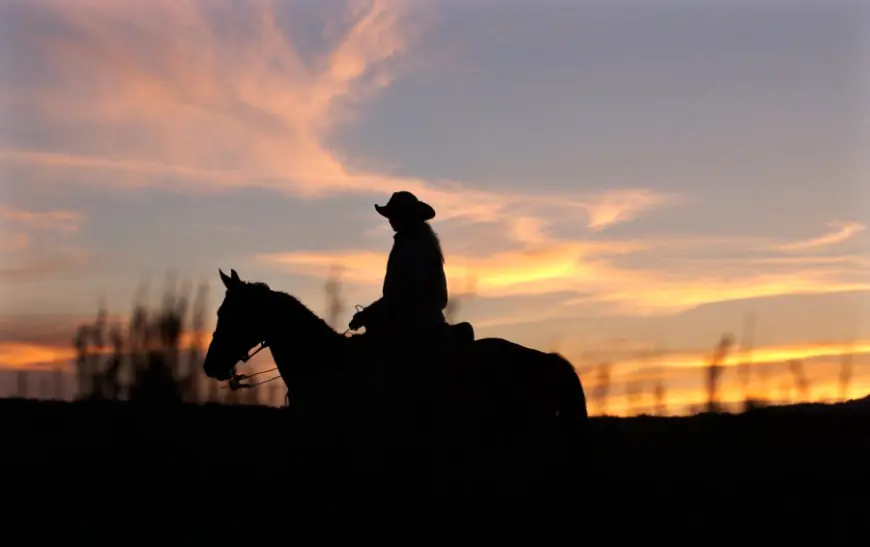Ahead of second wolf release, CPW offers conflict reduction training to ranchers
Colorado Parks and Wildlife is offering training for livestock producers to help them better coexist with reintroduced gray wolves through what the agency called "highly effective non-lethal deterrent methods."

DENVER (KDVR) — Colorado Parks and Wildlife is offering training for livestock producers to help them better coexist with reintroduced gray wolves through what the agency called "highly effective non-lethal deterrent methods."
The goal is to prevent further conflict-filled winters like in 2023-24 after the first group of 10 wolves was released into the state. While CPW did not confirm any wolf depredations until March, livestock producers were on edge as the winter rolled into spring. In April and May, eight depredation events were reported by CPW.
Depredations occur when a particular area or item has been destroyed or damaged. When discussing Colorado's wolf reintroduction program, that means livestock deaths caused by gray wolves. Claimants can file paperwork for their dead or injured livestock within 90 days of providing CPW with notice of the loss, or they can delay filing until the end of the year when the losses occurred.
“We are reaching out to producers across Colorado who are interested in learning more about non-lethal predator conflict reduction methods, whether wolves are in their community already or not,” said Dustin Shiflett, CDA’s Non-lethal Conflict Reduction Program Manager, in a CPW release. “Before new wolves are released in Colorado, we want to spread awareness about the tools available through the state and how to use hazing and other deterrents.”
The state plans to release another 10-15 wolves that will be relocated from British Columbia, Canada. CPW said the training is part of its effort to help producers implement non-lethal conflict mitigation tools, such as range riding, carcass disposal, guardian dogs and a flexible grant program.
The trainings are offered through a partnership with the Colorado Department of Agriculture, CPW, USDA-APHIS Wildlife Services and Colorado State University Extension.
“Colorado Parks and Wildlife is committed to supporting our agricultural community as we move forward with wolf restoration in the state,” said CPW Director Jeff Davis in a release. “These conflict reduction trainings are an essential step in ensuring that livestock producers are equipped with the knowledge and tools needed to minimize conflict with wolves. By working together with the Colorado Department of Agriculture and other partners, we can proactively address concerns and promote coexistence between livestock operations and Colorado's wildlife.”
Part of the goal in offering the trainings now is to ensure calving and lambing season in the early spring is as successful as possible.
“Through our conflict mitigation grants and through these trainings, CDA is building partnerships with trusted local leaders to help ranchers and livestock owners coexist with Colorado predators,” said Commissioner of Agriculture Kate Greenberg.
The trainings will include information on wolf depredation investigations, range riding, carcass management and livestock protection dogs. Four meetings were scheduled, including one held Tuesday in Craig from 10 a.m. to 2 p.m. The other announced dates are:
- Oct. 23, Steamboat Springs — 10 a.m. to 2 p.m.
- Nov. 4, Meeker — 6 p.m. to 9 p.m.
- Nov. 5, Glenwood Springs — 10 a.m. to 2 p.m.
More meetings are in the works, and all are free to the public with food provided. Advance registration is available online.
Right now, four meetings are scheduled, with more being planned. These meetings are free to the public and food is provided. Interested producers should register online to confirm their attendance. All of the meetings can be found on the CDA website here.
In addition, CDA, in conjunction with Working Circle, is also offering invitation-only hands-on stockmanship clinics in communities across Colorado. The first training had 17 producers in attendance and was held in Jackson County. The clinics will teach Bud Williams stockmanship techniques and offer time to practice these techniques hands-on with cattle during the second day of the clinic.
Producers interested in attending stockmanship training should contact the CDA Non-lethal Conflict Reduction Program Manager to learn about future opportunities.
There's also funding available to help producers with the financial burden of non-lethal conflict mitigation efforts. Applications for that funding are available on the CDA website here.
Questions about the trainings, stockmanship clinics, or grants, can be directed toward Dustin Shiflett, CDA non-lethal conflict reduction program manager, at dustin.shiflett@state.co.us or 720-902-1222.
What's Your Reaction?









































































































